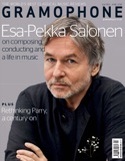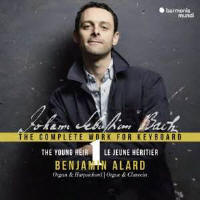Texte paru dans: / Appeared in: |
|
|
Outil de traduction (Très approximatif) |
|
|
Reviewer:
Philip Kennicott The first instalment of Benjamin Alard’s projected complete keyboard works of JS Bach is entirely auspicious. Subtitled ‘The Young Heir’, this three-disc set includes works performed on the harpsichord and organ, dating from (roughly) 1699-1705, the young composer’s childhood and apprentice years. The first CD includes works of musicians with whom Bach would have been familiar, among them members of his own extended musical family, including the greatest of his forebears, his great uncle Johann Christoph Bach, and his father-in-law, Johann Michael Bach. Also included are works by Frescobaldi, Froberger, Pachelbel, Marchand and de Grigny, along with Georg Böhm, whose work was particularly influential on the young Bach. Alard is equally accomplished on both the organ and the harpsichord and moves from one to the other with facility. The organ is used not just for the early chorales but also, on the third disc, for the Capriccio on the departure of his brother, BWV992, an effective choice. The three discs are organised both chronologically and geographically, documenting the early peregrinations of the composer as he emerged from the musical milieu of his brother’s town of Ohrdruf to his time in Lüneberg, where Böhm was a central figure, and his first professional posting in Arnstadt. Not surprisingly, the first two discs feel a bit scattered and unfocused, while the third reveals the composer coming into his own and contains the most substantial of the early works. Alard’s playing is a delight, clean and sensible, with striking agogic expressive power. On the early discs, his performances of works by Froberger and Kuhnau (a spare and melancholy little sonata) are even more striking than the Benjamin Alard is equally accomplished on both the organ and the harpsichord in the first volume of the complete keyboard works of JS Bach sometimes more workmanlike chorales and early fugues. But the third disc is full of evidence that the rest of this cycle will be a collection to be reckoned with, including fine renditions of the Suite in A major, BWV832, and the early, delightfully naive Aria variata alla maniera italiana, BWV989. Both the organ (from the Sainte-Aurélie church in Strasbourg, originally built in 1718) and the harpsichord (by Émile Jobin, based on a 1612 Ruckers and a 1747 Joannes Dulken instrument) are colourful and well suited to the repertoire. This is a project to watch with anticipation. |
|




